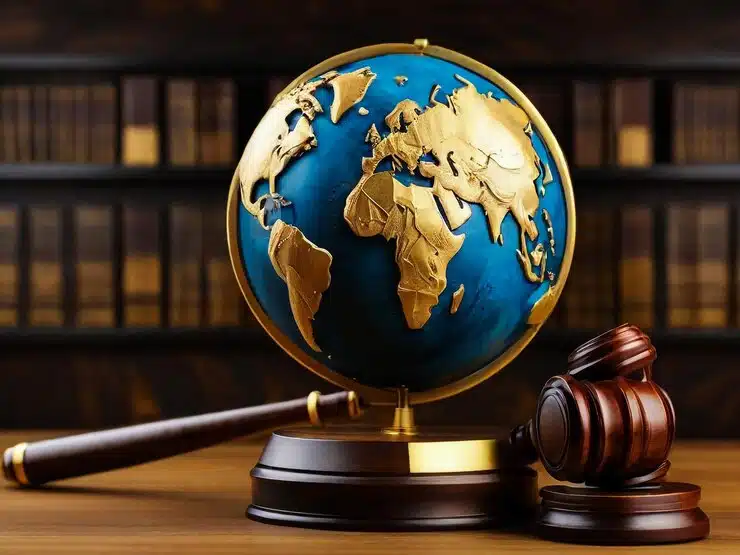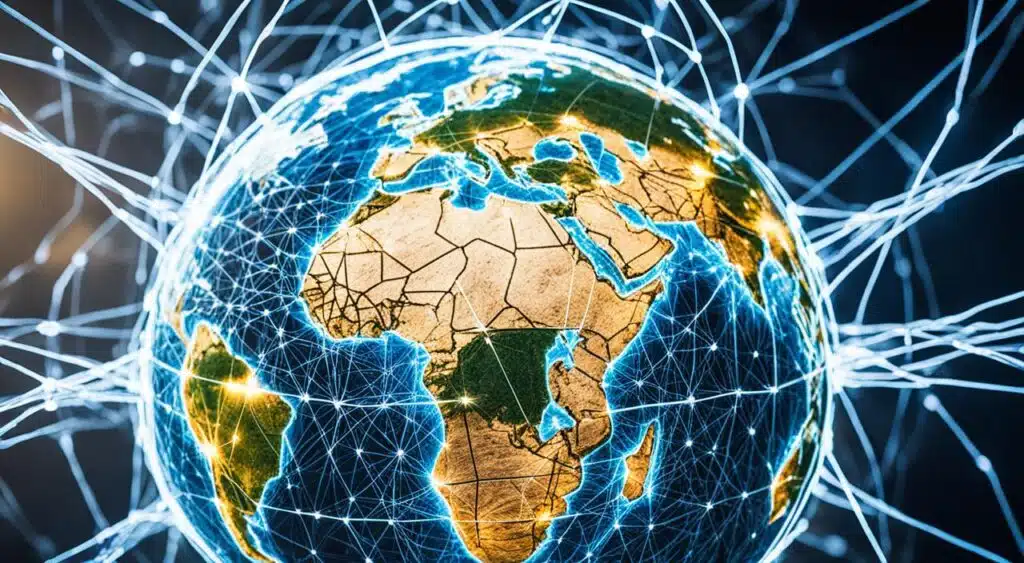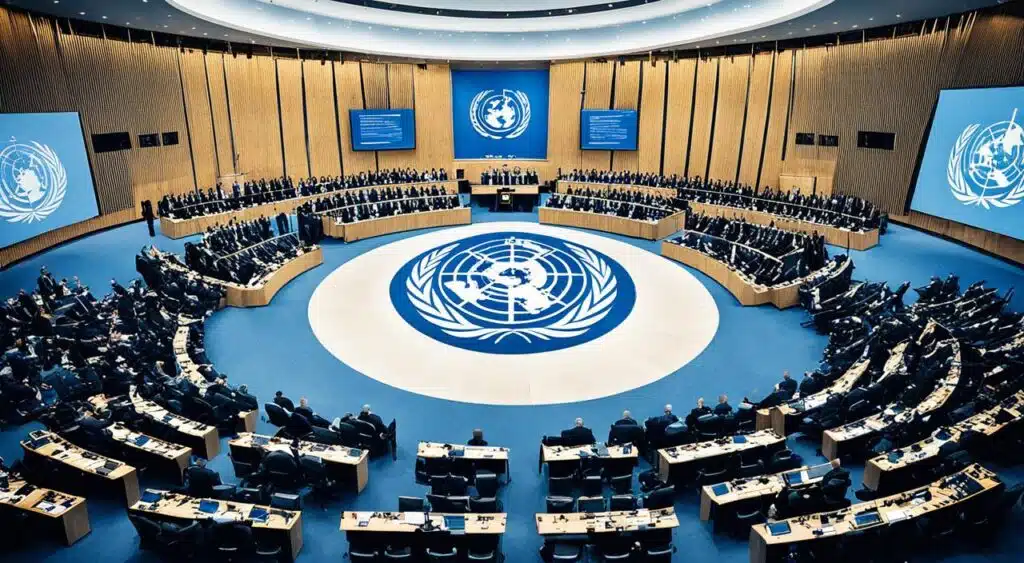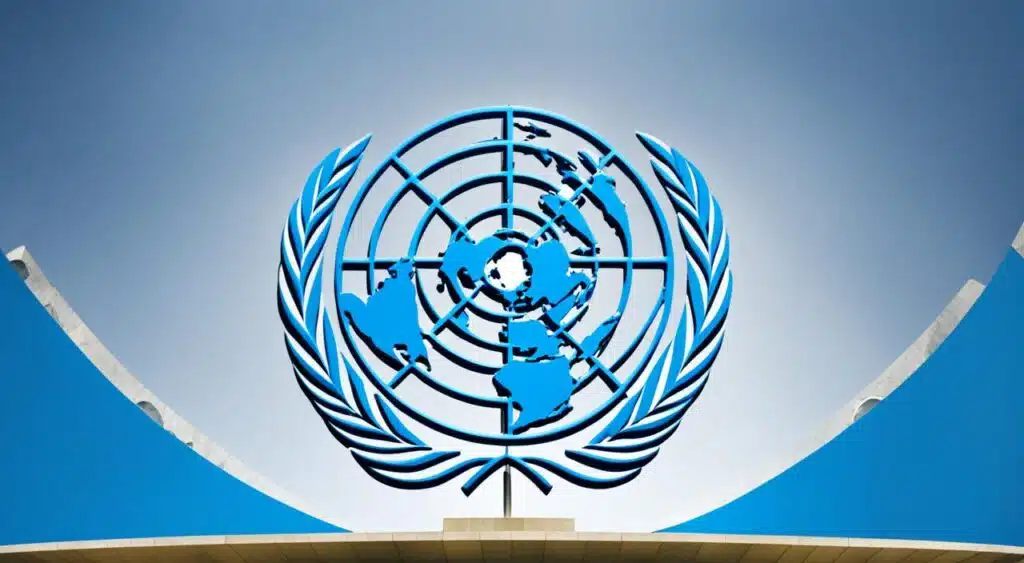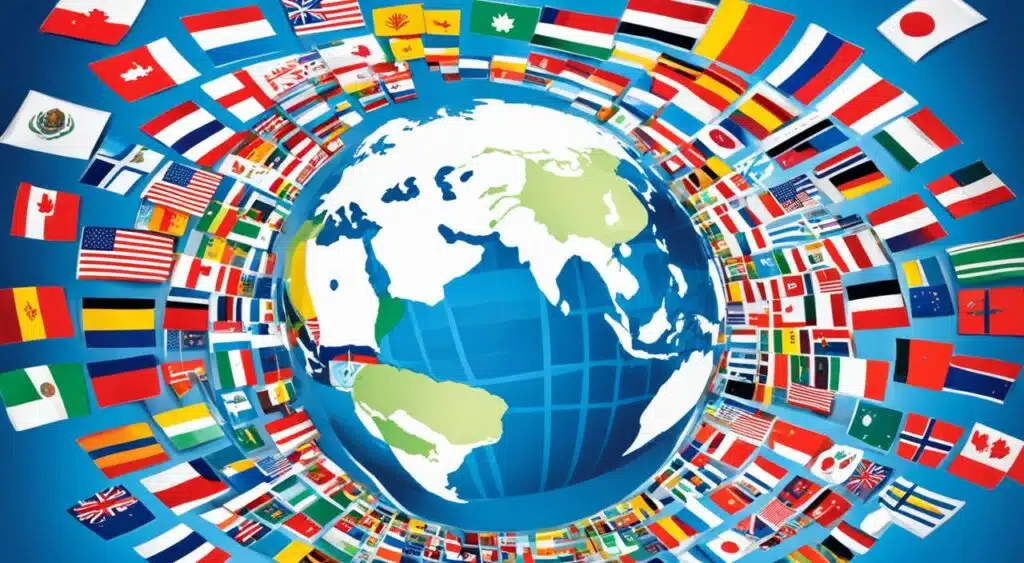International law is a complex field that helps nations work together and keep the peace. It sets clear rules for how countries should act towards each other and their people. It covers many important topics like human rights, disarmament, and how to handle conflicts.
It also deals with global issues like the environment, oceans, space, and trade. The main goal of international law is to help countries live in peace and solve problems without fighting. It supports important values like each country’s right to be its own government and protecting human rights.
Key Takeaways
- International law defines the legal responsibilities of states in their conduct with each other and their treatment of individuals within state boundaries.
- It encompasses a wide range of issues of international concern, such as human rights, disarmament, international crime, refugees, migration, nationality, treatment of prisoners, use of force, and the conduct of war.
- International law also regulates the global commons, such as the environment, international waters, outer space, global communications, and world trade.
- The main purpose of international law is to promote peace, security, and cooperation among nations.
- It establishes a framework for peaceful coexistence and conflict resolution, upholding principles like state sovereignty, non-interference, and the protection of human rights.
Also Read : How Are Administrative Law Decisions Made?
Introduction to International Law
International law is a complex field that deals with how countries, organizations, and people interact. It helps keep the world peaceful and stable. It covers many topics, like trade, human rights, and stopping war crimes.
Definition and Scope of International Law
International law is the set of rules that guide how countries and other groups act towards each other. It includes treaties and customs that have developed over time. The General Assembly of the United Nations helps make and set these laws.
Also Read : These 50 Photos Of Unique People Show That Genetics Is Hard To Forget
Importance of International Law in Global Affairs
International law is key for keeping the world in order and solving big problems that cross borders. It sets rules for countries and groups, helping to avoid fights and work together. It also helps settle disputes, protect human rights, and manage economic and environmental issues.
| Key Aspects of International Law | Examples |
|---|---|
| Governing Relations Between States | Treaties, diplomatic agreements, customary practices |
| Protecting Human Rights | Universal Declaration of Human Rights, International Covenants on Civil and Political Rights |
| Regulating International Trade | World Trade Organization (WTO) agreements, regional trade deals |
| Addressing Environmental Challenges | Paris Agreement on Climate Change, Biodiversity Conventions |
In summary, international law is vital in international relations. It helps countries work together, solve problems, and share values with other groups.
Also Read : What Are The Limits Of Constitutional Law?
Sources of International Law
International law comes from many sources, each important in its own way. Knowing these sources helps us understand the rules that countries follow. These rules cover everything from trade to human rights.
International Treaties and Conventions
Treaties and conventions are key sources of international law. They are agreements between countries that set out their rights and duties. The Vienna Convention on the Law of Treaties is a main rulebook for these agreements.
Customary International Law
Customary international law comes from how countries act over time. When certain actions become standard, they become law. This law is very important where there are no treaties or conventions, like the rules for the high seas.
| Source of International Law | Definition | Examples |
|---|---|---|
| Treaties and Conventions | Formal, legally binding agreements between nations |
|
| Customary International Law | Patterns of behavior and practices that are widely accepted as legally binding |
|
These sources of international law help countries work together, solve problems, and protect human rights. Knowing where these laws come from helps us deal with the challenges of our global world.
Also Read : What Are The Principles Of Civil Law?
Core Principles of International Law
International law is built on key principles that guide nations worldwide. These include state sovereignty, non-interference, and peaceful settlement of disputes.
Also Read : Habits Of Successful Low Study Students
State Sovereignty and Non-Interference
The idea of state sovereignty says each nation controls its own land and internal affairs. No other nation can get involved in these matters. The rule of non-interference stops states from interfering in others’ business, unless it’s allowed by law or the UN Security Council.
Peaceful Settlement of Disputes
International law pushes for peaceful resolution of disputes between countries. Instead of fighting, states should talk, mediate, arbitrate, or go to court. This way of solving problems is key to international law and is part of the UN Charter.
| Principle | Definition | Significance |
|---|---|---|
| State Sovereignty | Each state has exclusive jurisdiction over its territory and domestic affairs. | Protects the independence and integrity of states, preventing interference in internal matters. |
| Non-Interference | States are prohibited from meddling in the affairs of other states. | Upholds the principle of state sovereignty and promotes peaceful co-existence among nations. |
| Peaceful Settlement of Disputes | States must resolve international disputes through non-violent means. | Prevents the escalation of conflicts and maintains global stability and security. |
These core principles of international law help keep the world in order and cooperation. They make sure states respect each other’s sovereignty and solve problems peacefully.
International Humanitarian Law
International humanitarian law (IHL) is a set of rules aimed at reducing the harm of armed conflicts. It protects people not in the fight and limits how wars are fought. This law is key to protecting human dignity and reducing war’s harm.
The Geneva Conventions and their Protocols are the base of IHL. They guide how to treat civilians, prisoners, and the wounded in wars. Almost every country has signed these, making them key laws for war conduct.
IHL tackles many war issues, like protecting civilians, banning chemical weapons and sexual exploitation, and holding war criminals accountable. The United Nations leads in promoting and enforcing IHL. The UN Security Council makes sure those breaking these laws face justice.
International humanitarian law sets clear rules to lessen war’s harm. It ensures human rights and dignity are respected, even in tough times. As a key part of international law, it helps regulate war and protect the vulnerable.
“The Geneva Conventions are the foundation of international humanitarian law, which aims to limit the effects of armed conflict by protecting those who are not, or are no longer, participating in the hostilities.”
International Law and Human Rights
International law now focuses more on protecting human rights around the world. Key human rights treaties have set up a strong system. They help stop human rights abuses and make states answer for their wrongs.
Conventions on Human Rights
Important international human rights treaties include the International Covenant on Civil and Political Rights. Also, the International Covenant on Economic, Social and Cultural Rights, and the Convention on the Elimination of All Forms of Discrimination against Women. These treaties have set the standard for rights law. They help the world work together to stop human rights abuses.
Role of International Law in Protecting Human Rights
International law is key in protecting human rights and freedoms. It creates a legal system that lets international groups check on countries, look into wrongs, and help settle disputes peacefully. This helps with global governance of human rights law and the promotion of civil and political freedoms everywhere.
The growth of international human rights law is a big step in the fight for justice and protecting individual rights. As we face new challenges, international law is crucial in protecting human rights. It helps shape a fairer and more peaceful world.
International Criminal Law
The world has made big steps in creating laws to tackle serious crimes like genocide and war crimes. The International Criminal Court (ICC) and special courts have been key in ending impunity. They ensure those who commit these crimes are held accountable.
International Criminal Court (ICC)
The International Criminal Court (ICC) started in 2002 to go after individuals for international crimes. It can look into and try people for crimes against humanity, war crimes, and genocide. This court helps bring justice and protect human rights worldwide.
Ad Hoc Tribunals and Special Courts
Before the ICC, ad hoc tribunals and UN-assisted tribunals were set up for specific conflicts. The International Criminal Tribunal for the former Yugoslavia (ICTY) and the International Criminal Tribunal for Rwanda (ICTR) are examples. Special courts were also made for certain regions, like the Special Court for Sierra Leone.
These courts have been vital in fighting impunity and making sure those behind international crimes are held accountable. They set important legal precedents and help develop international criminal law.
| Judicial Body | Jurisdiction | Established |
|---|---|---|
| International Criminal Court (ICC) | Genocide, Crimes Against Humanity, War Crimes | 2002 |
| International Criminal Tribunal for the former Yugoslavia (ICTY) | War Crimes, Crimes Against Humanity, Genocide | 1993 |
| International Criminal Tribunal for Rwanda (ICTR) | Genocide, Crimes Against Humanity, War Crimes | 1994 |
| Special Court for Sierra Leone | War Crimes, Crimes Against Humanity | 2002 |
| Extraordinary Chambers in the Courts of Cambodia | Genocide, Crimes Against Humanity, War Crimes | 2003 |
International Law and the United Nations
The United Nations is key in making and applying international law. The UN Charter asks the organization to help solve international disputes peacefully. It also encourages the growth of international law.
UN Charter and International Law
The UN Charter is a main guide for international law. It lists the goals and aims of the United Nations. These include keeping peace and security, building good relations between countries, and supporting human rights and international law.
UN Bodies Involved in International Law
Many UN bodies work on international law. The General Assembly and its Sixth Committee focus on legal matters. The International Law Commission aims to make and improve international law. The International Court of Justice also helps interpret and apply international law.
- General Assembly and its Sixth Committee
- International Law Commission
- International Court of Justice
“The United Nations is a catalyst for international law, providing a platform for the negotiation, adoption, and implementation of treaties and conventions that shape the global legal landscape.”
International Law
The growth of international law has been a journey, reflecting global changes. It now covers many topics, like international trade and finance, environmental protection, and human rights. This growth includes making new laws, negotiating treaties, and applying legal rules by international courts and tribunals.
Even with challenges, international law is key for global cooperation, solving disputes, and keeping the rule of law worldwide. Member states, international organizations, and civil society work together to improve laws and understand rights and duties globally.
From its start to now, international law keeps changing. It affects areas like international trade, human rights, and environmental protection. Law students and legal practitioners must keep up with these changes. They need to understand the principles of international law and how international organizations and judicial decisions impact our world.
“International law is the foundation upon which the peaceful coexistence of nations is built.”
The work on international law is ongoing. Member states, international bodies, and the world are tackling new challenges. They aim to uphold rights and obligations in the public and private international law world. Through talks, negotiations, and applying legal rules, international law will keep evolving. It will shape international monetary and economic sanctions, affecting agreements between nations and domestic legal systems worldwide.
The Principles of International Law
- Sovereignty and non-interference
- Peaceful settlement of disputes
- Respect for human rights
- Environmental protection and sustainability
- Upholding the rule of law in international relations
Key Areas of International Law
- Public international law (e.g., treaties, diplomacy, international organizations)
- Private international law (e.g., cross-border contracts, jurisdiction, choice of law)
- International humanitarian law (e.g., laws of war, protection of civilians)
- International criminal law (e.g., ICC, ad hoc tribunals)
- International economic law (e.g., trade agreements, investment treaties)
As international law keeps changing, it’s important for law students, legal practitioners, and everyone to stay involved. Together, they can support the principles of international law and tackle the international rules and principles that connect our world.
Also Read: Importance Of Studying Laws
Conclusion
International law is key in shaping how the world works, solving conflicts, and protecting basic rights. It sets rules and principles for how countries, organizations, and people interact. These rules help keep the peace, security, and development around the globe.
The U.S. and the world face big issues like climate change, sea disputes, and space exploration. International law is more important than ever. It helps countries work together, settle disputes peacefully, and protect human rights.
As we move ahead, making international law stronger is vital. It helps the U.S. and the world deal with big challenges. By upholding state sovereignty and immunity, it makes global cooperation and conflict resolution more effective.
FAQs
Q: What is international law?
A: International law is a set of rules and principles that govern relations between states and other international actors. It covers a wide range of areas, from human rights to trade and conflict resolution.
Q: How is international law different from domestic law?
A: International law applies to the behavior of states and international organizations, while domestic law governs actions within a specific country. International law aims to regulate interactions between countries on a global scale.
Q: What is the role of the International Court of Justice (ICJ) in international law?
A: The ICJ, also known as the World Court, is the main judicial organ of the United Nations. It settles legal disputes between states and provides advisory opinions on international legal issues.
Q: How does international law contribute to the protection of human rights?
A: International law establishes mechanisms and norms to safeguard human rights at the international level. Treaties, conventions, and customary international law play a crucial role in promoting and protecting human rights globally.
Q: What are some examples of international legal instruments?
A: International legal instruments include treaties, conventions, protocols, and agreements that govern various aspects of international relations, such as trade, environmental protection, and diplomatic immunity.
Q: How does international law address disputes between sovereign states?
A: International law provides mechanisms for peaceful resolution of conflicts between states, such as negotiation, mediation, arbitration, and adjudication before international tribunals like the ICJ or specialized arbitral panels.
Q: What is the significance of customary international law?
A: Customary international law consists of practices and norms that countries consider binding out of a sense of legal obligation. It complements treaty law and reflects the general principles accepted by the international community.
